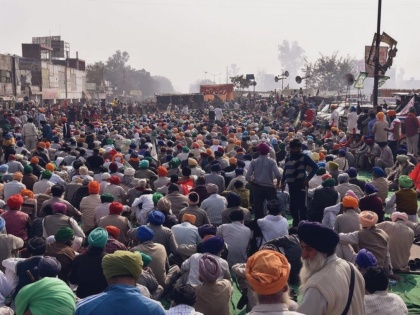Delhi Police Lifts Restrictions, Reopens Service Lanes at Singhu and Tikri Borders Amid Farmer Protest
By Lokmat English Desk | Published: February 27, 2024 08:19 AM2024-02-27T08:19:41+5:302024-02-27T08:20:44+5:30
Farmers who had come to Delhi to protest and had temporarily halted their demonstration are set to resume their ...

Delhi Police Lifts Restrictions, Reopens Service Lanes at Singhu and Tikri Borders Amid Farmer Protest
Farmers who had come to Delhi to protest and had temporarily halted their demonstration are set to resume their protest on February 29. They are currently awaiting a response from the Centre regarding the demands raised by farmer leaders. On Monday afternoon, traffic on the Noida-Greater Noida expressway was disrupted as farmers associated with the Bharatiya Kisan Union (BKU-Tikait) reached Mahamaya flyover and staged a sit-in protest. The Noida police facilitated a peaceful protest, allowing farmers to park their tractors in the green belt area under the Mahamaya flyover. After the protest, traffic returned to its normal flow. Simultaneously, another group of farmers conducted a protest in Jewar.
While talking to media Rajneesh Verma, Assistant Commissioner of Noida police, stated, "There were three to four groups of farmers affiliated with the BKU protesting in the city on Monday. One group was protesting in Jewar, another in central Noida, and a third near Mahamaya flyover."
In a related development, the Delhi Police reopened service lanes at Singhu and Tikri border points with Haryana, two weeks after sealing them due to the farmers' 'Delhi chalo' call. The process took time as the barriers were made of concrete. The reopening of these lanes aims to facilitate the smooth movement of vehicles to their destinations. Strict vigilance by the police and paramilitary forces continues around the clock.
Why are farmers protesting?
Delhi farmers are currently protesting due to several key demands related to agricultural policies and economic conditions. Their primary focus is securing guaranteed minimum support prices (MSPs) for their crops, ensuring that the government purchases all farm produce at state-set minimum support prices, which benefits approximately 7% of farmers who raise rice and wheat. The farmers are dissatisfied because although the government had previously committed to setting up a panel to address this issue following the 2021 protests, they claim that progress has been too slow
Additionally, the farmers seek a doubling of their income, which they believe has remained stagnant despite increasing costs of cultivation. They also want the government to honor a promise to compensate families of farmers who lost their lives during the 2020-2021 protests and to take legal action against individuals responsible for harming protesters. Furthermore, they request the cancellation of criminal charges filed against protesters, the formation of a pension system for farmers, and the increase of workdays under the Rural Employment Guarantee Scheme to 200 days
These demands reflect the farmers' desire for greater protection and fairness within the agricultural sector, particularly given the potential impact of the World Trade Organization (WTO) and free trade agreements on their livelihoods
Open in app